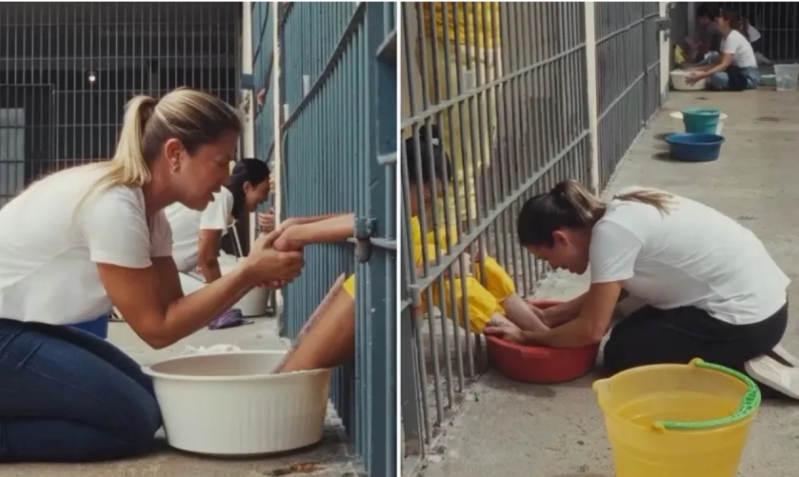
In a women's prison in the state of Goiás, Brazil, a group of Christian women carried out an evangelism initiative that deeply moved both the inmates and those who participated. Inspired by the example of Jesus, they washed the feet of the inmates, shared Holy Communion, and offered them a space where, in their own words, “they not only ate, but sat at the table to belong.”
The initiative was led by Pastor Shaila Manzoni, from the IDE Church in Brasília, who has been conducting these kinds of activities in prison units for years through the organization she founded: A.M.E. (Ame Mulheres Esquecidas, or Love Forgotten Women), dedicated to supporting incarcerated women.
“Jesus invites us to live the Gospel through concrete actions,” explained Manzoni. “The washing of feet is a calling. Jesus breaks the master-slave logic and inaugurates the new circular order of the Kingdom, where no one is disposable,” she said.
During the event, the women prayed, sang, shared the Word of God, and celebrated the Lord’s Supper. Some inmates danced, cried, and received prayer, while volunteers praised God from outside the bars. Several of them were also baptized as a public expression of their faith.
A dream turned mission
The NGO A.M.E. was born in 2018 from a personal dream Pastor Manzoni had, in which she saw herself caring for forgotten women in a prison. Two years later, in 2020, the first visit to a prison took place, marking the beginning of various social projects aimed at reintegrating and dignifying women in incarceration.
Since then, the organization has developed actions that provide material and emotional assistance, training courses, legal aid, and spiritual support programs. Over five years with A.M.E., they have washed more than 800 feet, baptized 202 women, distributed 2,160 hygiene and food kits, and facilitated 555 legal consultations. They also connected women who received no visits with “godmothers” who write to them and offer emotional support.
“Love doesn’t ask who deserves it, but who needs it,” said the pastor. “They need us,” she added.
A model for real reintegration
The NGO also shared a striking statistic: among 850 women who served their sentence at the Luziânia unit between 2020 and 2024, only 3 reoffended — a recidivism rate of just 0.35%, far below the national average of 42%, according to Brazil’s National Secretariat for Penal Policies (SENAPPEN).
“The world measures in numbers, but this isn’t just a statistic — it’s proof of a possible path,” said Manzoni. “A safe society isn’t one that imprisons more, but one that reintegrates, rebuilds, and chooses not to give up on its people,” she concluded.
Originally published on Diario Cristiano, Christian Daily International's Spanish edition.





